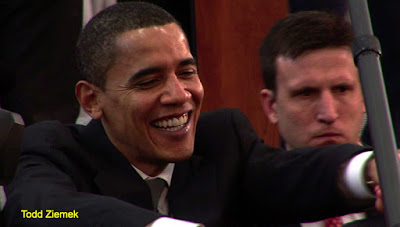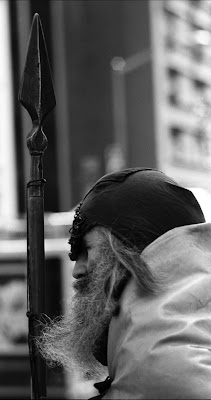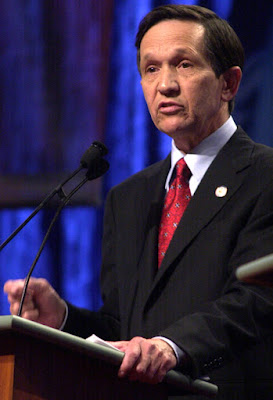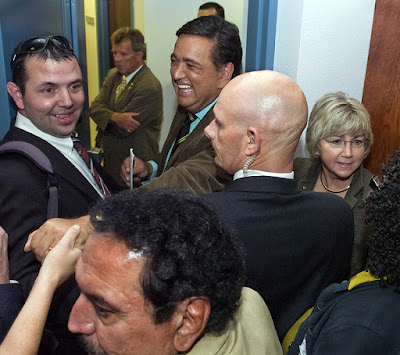
New Mexico Gov. Bill Richardson got 2.11 percent, with 53 votes in the Iowa Caucus. He remains fourth behind the new Democratic front-runner, Illinois Sen. Barack Obama, who received 37.58 percent, with 940 votes, followed by former North Carolina Sen. John Edwards with 29.75 percent, with 747 votes, and New York Sen. Hillary Clinton, with 29.47 percent, with 737 votes. For more details check the Iowa Democratic Party Caucus results and the New York Times.
Delaware Sen. Joseph Biden Jr., received 23 votes, for 0.93 percent, Connecticut Sen. Christopher Dodd received a single vote, for 0.02 percent. There were three uncommitted votes, for 0.14 percent. Two candidates, former Alaska Sen. Mike Gravel and Ohio Rep. Dennis Kucinich received no votes.
Biden and Dodd announced their withdrawal from the race after their poor showing in Iowa.
The Iowa Caucus results from its 1,781 precincts are used to determine delegates and alternates to their county Democratic conventions. At those conventions, held between April 26 and June 14, the Iowa Democratic Party will choose 46 delegates to the national convention.
The Republicans will choose their 37 national party convention delegates on June 14.
According to the Iowa Republican Party:
Former Arkansas Gov. Mike Huckabee got 34.4 percent, received 160 caucus votes with 40,841 total votes. The total votes translate into caucus votes that will be used to determine national convention delegates.
Former Massachusetts Gov. Mitt Romney got 25.2 percent, received 31 caucus votes with 29,949 total votes.
Former Tennessee Sen. Fred Thompson got 13.4 percent, received 24 caucus votes with 15,904 total votes.
Arizona Sen. John McCain got 13.1 percent, received 22 caucus votes with 15,559 total votes.
Texas Rep. Ron Paul got 10.0 percent, received 19 caucus votes with 11,817 total votes.
Former New York City Mayor Rudolph Giuliani got 3.5 percent, received one caucus vote with 4,097 total votes.
California Rep. Duncan Hunter got 0.4 percent, with 524 total votes.
Colorado Rep. Tom Tancredo got 0 percent, received one caucus vote with five total votes.
Those are the facts, but what do they mean? The Iowa Caucus, is at best, confusing.
The New Hampshire primary is tomorrow. New Hampshire, based on its own law, is the first primary in the nation and will directly select delegates to the major national party conventions. Registered independents may take a ballot from either the Republican or Democratic Parties. Up to 30 percent of the voters may be independents.
“Pretty crazy here in NH now, from my observation,” writes in Video Photojournalist Todd Ziemek. “I think the nation is going to be surprised (if their not already) on how many people want change...”
 Ziemek, who used to be a KOAT TV videographer, has been covering the campaign trail, being in Iowa last week and his, new home state, of New Hampshire sends this stilled frame of Obama from his last assignment.
Ziemek, who used to be a KOAT TV videographer, has been covering the campaign trail, being in Iowa last week and his, new home state, of New Hampshire sends this stilled frame of Obama from his last assignment. 
 This is Moondog; he was a soothsayer who used to stand on New York City sidewalks carrying a spear, wearing homemade clothing, including a cape and a cap. Here he is in front of the CBS building in New York City in the fall of 1969. Later in life he wore a helmet with horns and was referred to as “the Viking.” At first glance, one might think he was no more than a stoic forecaster of the truth.
This is Moondog; he was a soothsayer who used to stand on New York City sidewalks carrying a spear, wearing homemade clothing, including a cape and a cap. Here he is in front of the CBS building in New York City in the fall of 1969. Later in life he wore a helmet with horns and was referred to as “the Viking.” At first glance, one might think he was no more than a stoic forecaster of the truth.However, there was much more to Moondog. Born Louis Hardin, in Maryville, Kansas, he lost his eyesight in a railroad fuse accident when he was 17. He attended the Iowa School for the Blind where he studied music. Hardin would become a musical great; some called him an icon. His eccentricity seemed to get in the way of his talents. He was written about, he was sung about by singers of the caliber of Janis Joplin and Bob Dillon. Hardin was an accomplished classical musician. He also wrote poetry and music and performed in Carnegie Hall.
Soothsayers have been around since the dawn of time; the most famous, Shakespeare’s character whom, in Julius Caesar, warned “Beware the Ides of March.”
 I am no soothsayer; not even a political prognosticator. However, the early events of Iowa and New Hampshire, as far as I can tell, are not accurate indicators of the will of the populace, but simply because they are first, they have a disproportionate effect on our election process. New Hampshire, by allowing independents to vote skews the party system. In a way that might be a good thing, as it expresses the will of the people, however because it is one of the few places that does not adhere to the strict party choices it changes the dynamics.
I am no soothsayer; not even a political prognosticator. However, the early events of Iowa and New Hampshire, as far as I can tell, are not accurate indicators of the will of the populace, but simply because they are first, they have a disproportionate effect on our election process. New Hampshire, by allowing independents to vote skews the party system. In a way that might be a good thing, as it expresses the will of the people, however because it is one of the few places that does not adhere to the strict party choices it changes the dynamics.So what’s wrong with this picture?
 This is Ohio Congressman Dennis Kucinich, seen here during the September 4, 2003, Democratic Party Presidential candidate debate at the University of New Mexico's Center for the Arts' Popejoy Hall. He did not take the stage in New Hampshire Saturday night and he is mad about it.
This is Ohio Congressman Dennis Kucinich, seen here during the September 4, 2003, Democratic Party Presidential candidate debate at the University of New Mexico's Center for the Arts' Popejoy Hall. He did not take the stage in New Hampshire Saturday night and he is mad about it.It seems that ABC, which broadcast the debate, created some rules that limited which candidates would be allowed into their televised debate. In order to be eligible to participate, ABC required that a declared candidate must have one of the three: finished in the top four positions in the Iowa Caucus; or place with more than five percent in one of four the most recent state polls; or place with more than five percent in one of the four most recent national polls.
Kucinich filed a complaint with the Federal Communications Commission. According to the Associated Press, as seen on the ABC site, but not part of their on-air reporting.
"ABC should not be the first primary," Kucinich complained, in his filing. He claimed, that ABC’s parent company, Disney, had made political contributions to the four Democratic candidates who took the stage, but not to him.
Kucinich asked the FCC to enforce the equal-time provision of their rules. Unfortunately, the equal-time provision of the Fairness Doctrine no longer applies as a rule, since deregulation of the communications industry under Ronald Reagan’s presidential administration.
Reagan, you may recall, started his professional life as a radio sportscaster calling baseball games. He went on to be: a movie actor, the President of the Screen Actor’s Guild, was host of the TV programs “General Electric Theater” and “Death Valley Days,” and then spokesman for General Electric; before running for governor of California.
Reagan might have had some insight when he ordered deregulation as the cable industry expanded and the concept of pay TV was taking hold.
One of the reasons for voiding the fairness doctrine’s equal-time provision was the argument that political candidates had access to putting forward their message based on economics, or the ability to buy advertising time.
 My Take
My TakeKucinich makes a valid point; why should a network determine whom the American people see as a valid candidate after a single political exercise?
Disney, along with General Electric, are two of the six large companies that control the majority of media outlets in this country.
So, the question of one-man, one-vote is in jeopardy as big corporations influence the public through their contributions and their exercise over who gets air time.
 My crystal ball is hazy. I don’t know what Richardson might do. He has several options available to him should the presidential run fail. Being governor, starting just his second year of his second four-year term he can do several things and if they fail he’s still governor. He could enter the U.S. Senate race for the seat left open by Pete Domenici’s retirement. By all accounts, Richardson could walk away in that race. He is term limited, so if he won the Senate race he would extend his uninterrupted political life with the six-year term. It also would place him in another high profile political position that, should a Democrat not take the White House, he would be positioned to take another run at the presidency from the Senate in 2012. A lot of people think he has a good chance of being selected as the vice presidential running mate to whomever wins the Democratic party’s nomination, or he might be appointed to a cabinet post should a Democratic become president.
My crystal ball is hazy. I don’t know what Richardson might do. He has several options available to him should the presidential run fail. Being governor, starting just his second year of his second four-year term he can do several things and if they fail he’s still governor. He could enter the U.S. Senate race for the seat left open by Pete Domenici’s retirement. By all accounts, Richardson could walk away in that race. He is term limited, so if he won the Senate race he would extend his uninterrupted political life with the six-year term. It also would place him in another high profile political position that, should a Democrat not take the White House, he would be positioned to take another run at the presidency from the Senate in 2012. A lot of people think he has a good chance of being selected as the vice presidential running mate to whomever wins the Democratic party’s nomination, or he might be appointed to a cabinet post should a Democratic become president.Though his resume looks good, and he has made some gaffs along the campaign trail so far, he has missed a couple of political opportunities, like announcing late, after Obama, that may indicate his failure to have a razor sharp political sense. He still can cut deep, but can he cut through the political din?
 His campaign is not dead in the water today, as some pundits wish; yet it might be tomorrow night…
His campaign is not dead in the water today, as some pundits wish; yet it might be tomorrow night…As for Richardson’s two percent, I believe he will try to stay in the race until Feb. 5, when the Super Tuesday primaries, including New Mexico’s Democratic Party’s caucus, takes place. New Mexico’s Primary is the last in the nation, held on June 3, along with South Dakota.
 The bumper stickers should be fairly weathered by then. Or they might read Richardson for Senate… .
The bumper stickers should be fairly weathered by then. Or they might read Richardson for Senate… .
1 comment:
Re: Kucinich -- he was told months ago about the rules for inclusion in the debate, but only objected hours before the debate. All the candidates had agreed to the rules previously, according to ABC.
And as for Richardson... well, I hope he doesn't run for Senate here. He would win convincingly, but he would be stabbing Tom Udall in the back. And I doubt he will do that, since Amanda Cooper (Richardson's Deputy Campaign Manager) happens to be Tom Udall's step-daughter.
Post a Comment